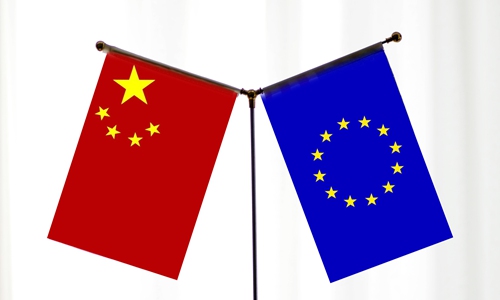
China EU Photo: IC
In an attempt to badmouth China-Europe relations, a New York Times article on Thursday deliberately and maliciously exaggerated the differences between the two sides in terms of trade, Hong Kong, human rights and other issues. It claimed that "Beijing's hopes of using Europe as a counterweight to the United States have faltered" as country after country confronts China over the above-mentioned issues. It portrayed China as a nation drawing "growing popular animosity" from European countries and also stressed that "China's authoritarianism is fundamentally at odds with Europe's political values despite continued pledges that Beijing seeks peaceful collaboration."
This narrative, however, does not align with the reality of China-Europe relations. It is nothing but a hateful attempt to drive a wedge between China and Europe.
The article begins by citing an obscenity-laced public letter to China written by Pavel Novotny, a district mayor in Prague, after Chinese Foreign Minister Wang Yi rebuked the Czech Senate speaker's visit to Taiwan, as an example to show "how far China's standing in Europe has fallen." However, does a hysterical Czech politician who intends to garner attention with his letter full of expletives represent the mainstream views on China in Europe? The answer is absolutely no.
China-Europe relations in general have maintained a stable development. One day before the New York Times article was published, Eurostat said China became the top trading partner of the European Union in the first seven months of 2020, a position previously held by the US. The NYT article in fact is full of jealousy and malice. It reveals the US' traditional diplomatic forces, represented in conservative media outlets like the New York Times, are quite anxious and psychologically imbalanced about the reality that the US is going astray in international relations.
In fact, the New York Times' view on China-Europe relations is more applicable to US-Europe relations and their growing rifts. As Washington coerces European countries to act as it wishes on issues including 5G and the Nord Stream 2 gas pipeline without considering the interests of the latter, Europe has only become more resentful toward the US.
In contrast to the US' attempts to pressure Europe into an anti-China camp led by the US, China does not intend to dismantle Europe-US relations, or force Europe to do anything against its will, or cripple its independence to counterweight the US. Europe doesn't want to pick sides and is emphasizing strategic autonomy, which China has great respect for.
The attempts by some Western media or anti-China forces to sow discord in China-Europe relations won't succeed. China-Europe cooperation is bound to expand, and this is determined by the common interests of both parties. The fact is, China and Europe need each other more than ever in the face of rising destructive anti-globalization forces and radical populism. In particular, the US' trampling of multilateralism and attempts at waging a new cold war have reinforced the need for China and Europe to mutually support each other in safeguarding multilateralism and promoting a multipolar world.
During the recent China-Germany-EU leaders' meeting via video link, leaders from the European side, including German Chancellor Angela Merkel, European Council President Charles Michel and European Commission President Ursula von der Leyen, emphasized that China is an important strategic partner respected by the EU. They agreed it is imperative for Europe and China to strengthen cooperation, jointly safeguard multilateralism, resist unilateralism and protectionism, and respond more effectively to various global challenges.
It needs to be pointed out that ideological differences between China and Europe have existed for a long time, but this has not prevented the two sides from developing and deepening mutual cooperation. It is sufficient enough to understand that differences between China and Europe are controllable and won't evolve into full-scale confrontations.
There are of course some noises in China-Europe relations when it comes to issues like Hong Kong and human rights. Indeed, dissatisfaction has been rising against China within some European countries. This is the challenge that both sides must address respectfully in order to further advance ties. China won't yield and will decisively take corresponding countermeasures when faced with provocations that challenge its core interests, such as the Czech Senate speaker's Taiwan visit. But it's advocated that China and Europe jointly work to explore how to avoid clashes of values and achieve coexistence and mutual tolerance.
China-Europe relations are complicated and developing amid differences. The relationship between the two cannot be derailed by such malicious attempts. This is the true picture of the bilateral relationship. Although there are different views over certain issues, the general trend of China-EU positive cooperation will not be affected.
The author is a reporter with the Global Times. opinion@globaltimes.com.cn




